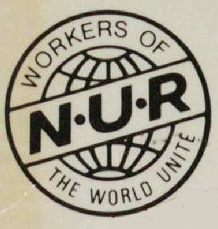Related Research Articles

Thomas Mann, was an English trade unionist and is widely recognised as a leading, pioneering figure for the early labour movement in Britain. Largely self-educated, Mann became a successful organiser and a popular public speaker in the British labour movement.

The National Union of Railwaymen was a trade union of railway workers in the United Kingdom. The largest railway workers' union in the country, it was influential in the national trade union movement.
The Workers' Union was a general union based in the United Kingdom, but with some branches in other countries. During the 1910s, it was the largest general union in the UK, but it entered a rapid decline in the 1920s, and eventually became part of the Transport and General Workers' Union (TGWU).

John Hodge was a Labour Party and later Coalition Labour politician in the United Kingdom. He was the UK's first Minister of Labour, and the second Minister of Pensions.

Fred Bramley was the second General Secretary of the British Trade Union Congress (TUC).

Charles George Ammon, 1st Baron Ammon, PC, DL, JP was a British Labour Party politician.
George Lathan was a British trade unionist and politician. He was the Member of Parliament (MP) for Sheffield Park from 1929 to 1931 and from 1935 until his death.

Rhys John Davies was a British trade unionist and Labour Party politician.
The National Amalgamated Union of Labour (NAUL) was a general union in the United Kingdom.

Patrick Thomas Daly, known as P. T. Daly was an Irish trade unionist and politician.

John William Ogden was a British trade unionist.
Walter Halls was a British trade unionist and politician.
George Peet was a British communist activist and trade unionist.
William Devenay was a British trade unionist and politician.
Peter Joseph Tevenan was an Irish trade unionist and politician.
John William Kneeshaw was a British political activist.
Matthew Burrow Farr was a British trade unionist and Labour Party politician.
Harry Dubery was a British labour movement activist.
James Stott was a British trade union leader, who became secretary of the International Federation of Textile Workers.
Tom McLean was a trade unionist and political activist.
References
- ↑ "Postal workers and syndicalism". Manchester Guardian. 16 April 1914.
- 1 2 The Labour Who's Who. London: Labour Publishing Company. 1927. p. 159.
- ↑ Craig, F. W. S. (1983). British Parliamentary Election Results 1918–1949 (3 ed.). Chichester: Parliamentary Research Services. p. 352. ISBN 0-900178-06-X.
- ↑ Annual Report of the Labour Party: 42. 1921.
{{cite journal}}: Missing or empty|title=(help) - ↑ Suthers, R. B. (1932). "Union of Post Office Workers". The Labour Magazine. Vol. 11.